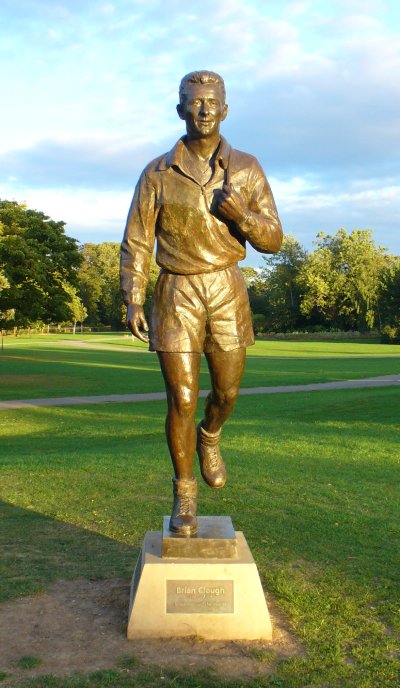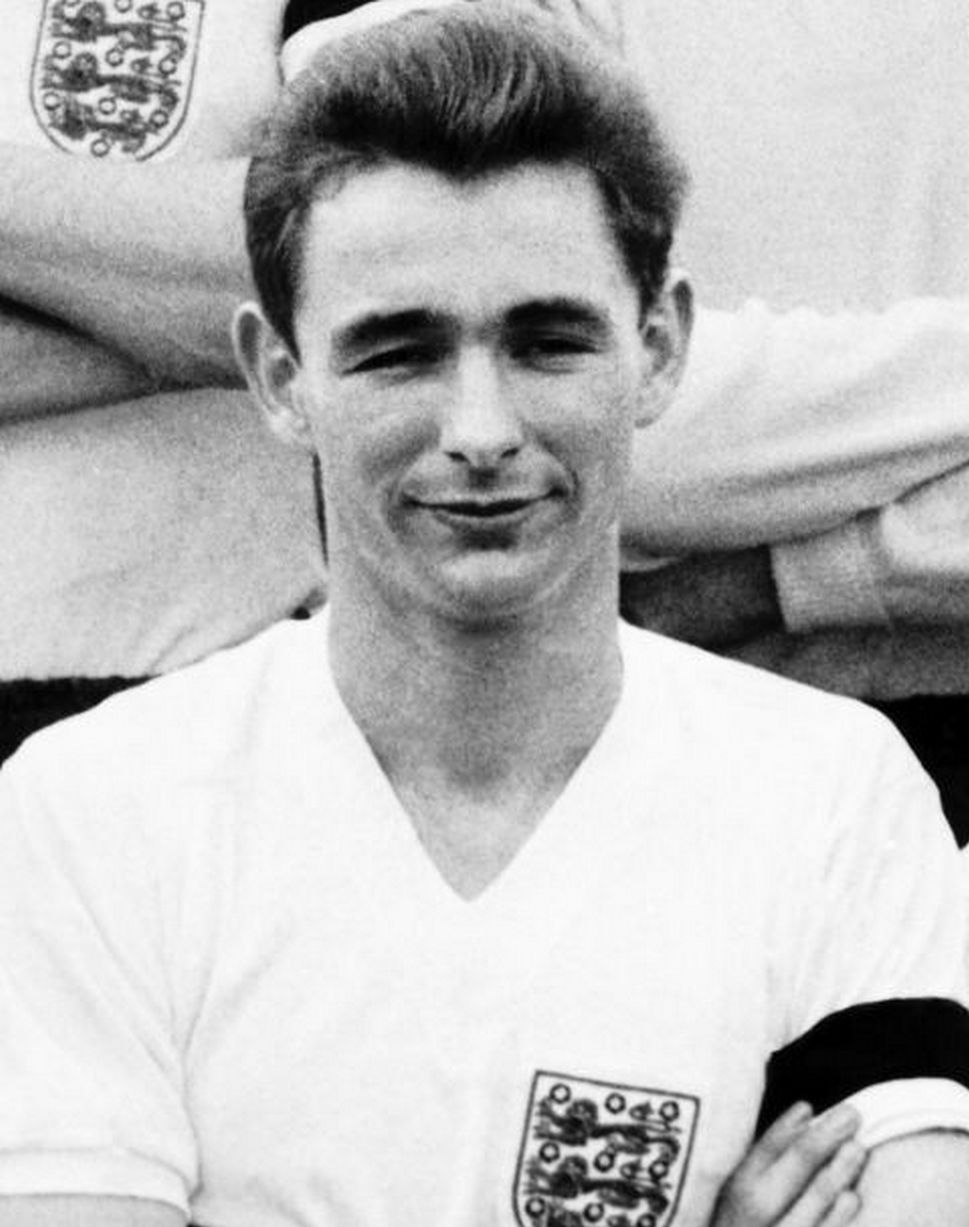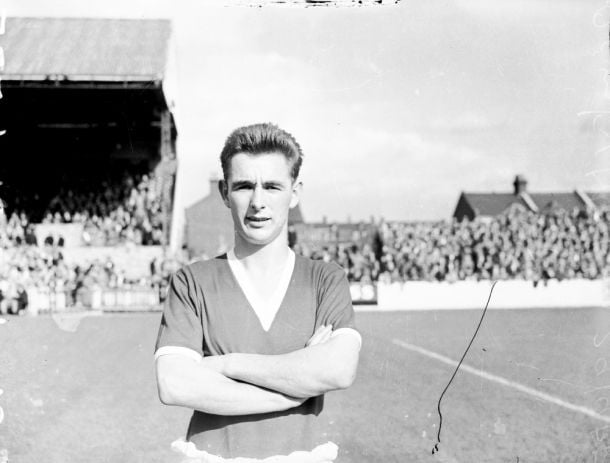When I go, God's going to have to give up his favourite chair.
This year marked the tenth anniversary of the death of Brian Howard Clough, European Cup-winner, quote machine and the man widely regarded as The Greatest Manager England Never Had™. However, while the world remembers him as an outspoken genius in the dugout and an arrogant master of punditry, his career began in a way that fits perfectly with the myth and the aura which he built up over a managerial career spanning four decades. Long before he took his first training session at Hartlepools United, Brian Clough was an outspoken genius in front of goal.
Clough began his footballing career at just 16 years old, signing as an amateur for hometown club Middlesbrough in November 1951. Within less than six months, he had won himself a professional contract. Boro's manager at the time was David Jack, a former England striker who had plundered more than 250 goals for Plymouth Argyle, Bolton Wanderers and Arsenal, signing for the Gunners for a then-world record fee of £10,890. How times change.
Jack knew what it took to put the ball in the net and saw potential in the precocious youngster Clough, but a spell of national service with the RAF disrupted his development and he failed to win a place in the starting eleven despite three years training at the club.
"At first Middlesbrough thought I was too mouthy, too awkward. They used that as an excuse not to see what I could do on the pitch." - Clough, 1989
However, reserve goalkeeper Peter Taylor - who would later become Clough's assistant at Derby, Brighton and Nottingham Forest - could see the talent in his boots and swayed new manager Bob Dennison into handing the forward his debut in 1955, against Barnsley. Clough was just 20, but soon set about writing his name into the record books, and out of his teammates' Christmas card lists.
Within three years his goalscoring tally was rising exponentially, and he turned out for the England u23s, as well as the England C side. He also scored five goals for the FA’s Select XI in an exhibition against a British Army XI, perhaps using his time with the RAF as extra motivation for the game - not that Clough needed telling to put the ball in the net.
"The only thing I enjoyed during my six years at Middlesbrough was scoring goals. From Saturday to Saturday I was very unhappy. My ability was never utilised, by me or the management. Only goals kept me sane. That was my only pleasure." - Clough, 1973
If goals were the only thing that made him happy, then Clough's time at Ayresome Park can't have been all that bad - he scored 204 of them in just 222 games. Despite this, he was not a popular man with his teammates. There were allegations of his goalscoring tally taking precedent over the team, with Clough even said to knock better-positioned teammates out of the way so that he could score himself. He sulked after defeats and, in a way similar to Johan Cruyff, would constantly criticise others during games - worse still for those being chastised, more often than not he was right.

However, Clough was never a man to stand back and be condemned and responded with far more serious allegations of his own, publicly accusing his teammates of betting on Middlesbrough losses - a theory now widely accepted. How else could they remain mired in the Second Division with Clough firing more than 30 goals each and every season? Confusingly, he was later made captain, a decision which led to a scuffle in the changing room and a petition from the rest of the team to have him removed.
The Boro fans rallied around their team and a cascade of boos greeted Clough's every touch in their next home game. However, for once Clough kept his mouth shut and let his feet do the talking; he scored a stunning hat-trick, with all three goals coming from outside the penalty area. His doubters were n0t silenced, and Clough continued his annual tradition of handing in a transfer request. Eventually, it was granted he moved to North East rivals Sunderland for £42,000 in the Summer of 1961.
The goals did not dry up - he smashed a further 54 goals in 61 league appearances for the Black Cats - but his playing career would soon be brought to a juddering halt. On Boxing Day of 1962, Sunderland faced Bury in driving rain and with ice forming on the goalposts. He was put through on goal and, attempting to take the ball past goalkeeper Chris Harker, collided with the keeper and remained down, stricken on the turf. Though he tried to stand, the medial and cruciate ligaments in his knee had been severed. The injury would usually spell the end of a player's career.
"I got one or two goals a season, give or take the odd 30." - Clough, 2004
Under disciplinarian manager Alan Brown - said to have had a huge influence on Clough's managerial style - the striker attempted to train his way back to fitness and made his return to the pitch a full two years later. And yet, the magic from Clough's feet had disappeared; after just three appearances, he brought his playing career to an ignominious conclusion.
Understandably, Clough was distraught and lashed out angrily when sacked as a youth coach by Middlesbrough boss George Hardwick; the board of directors had still not forgiven him for his acrimonious exit from the club four years earlier. He turned to alcohol, and the drinking problems which would plague him to his tragic death in 2004 began.
"When I went to bed, instead of counting sheep, I'd count the drinks I'd had. If I'd had six, I'd call if five. I'd kid myself about the numbers, like all drinkers do." - Clough admitting his alcoholism in an interview in 2003.
With video footage of the time a huge rarity, we must turn to the numbers to put Clough's playing career into context, and they do not underestimate his goalscoring prowess. Of the players that have scored over 200 goals in the English leagues, he has the highest goals per game ratio of 0.916. He finished his career with 267 goals in 297 appearances for the two North East sides, including a monumental haul of 18 career hat-tricks.
Despite his constant bickering with the club, Clough remains one of Middlesbrough's favourite sons and he speaks with huge fondness of his childhood on Teesside. “If anyone should be grateful for their upbringing, for their mum and dad, I'm that person. I was the kid who came from a little part of paradise,” he said.

As the anniversary of the injury which ended Clough's career in 1962 draws towards us this festive period, cast a thought back to the flame which was extinguished on that icy Roker Park pitch more than half a century ago. To his own mind at least, Clough may not have been the best striker around - but he was in the top one.








































